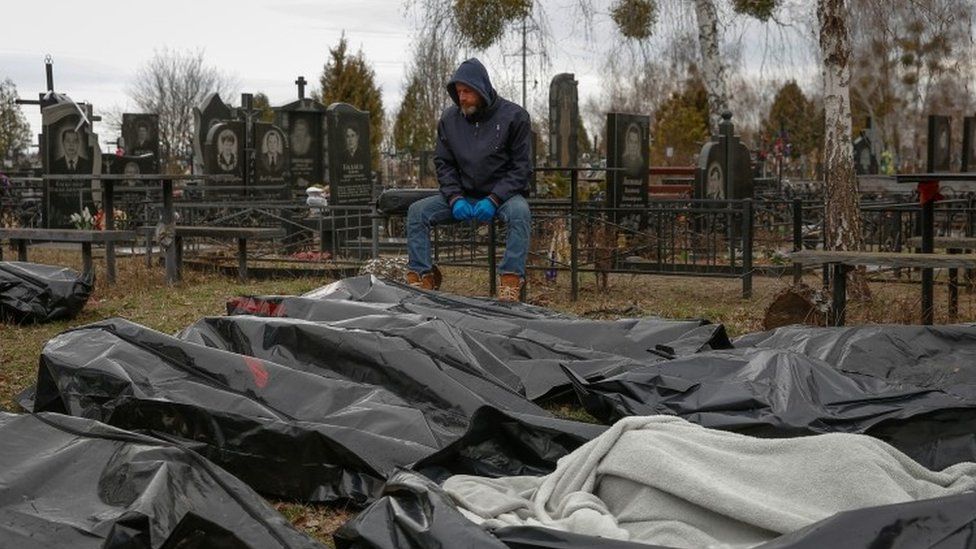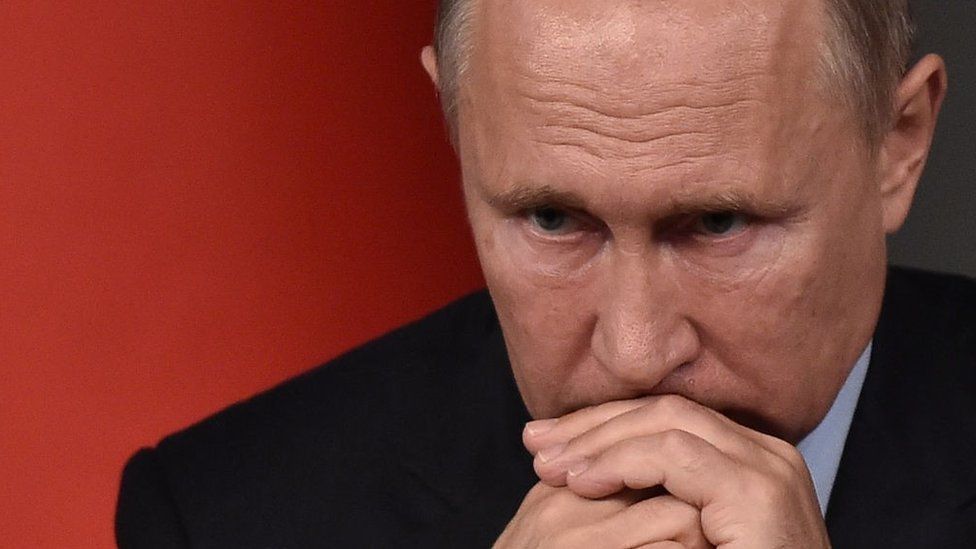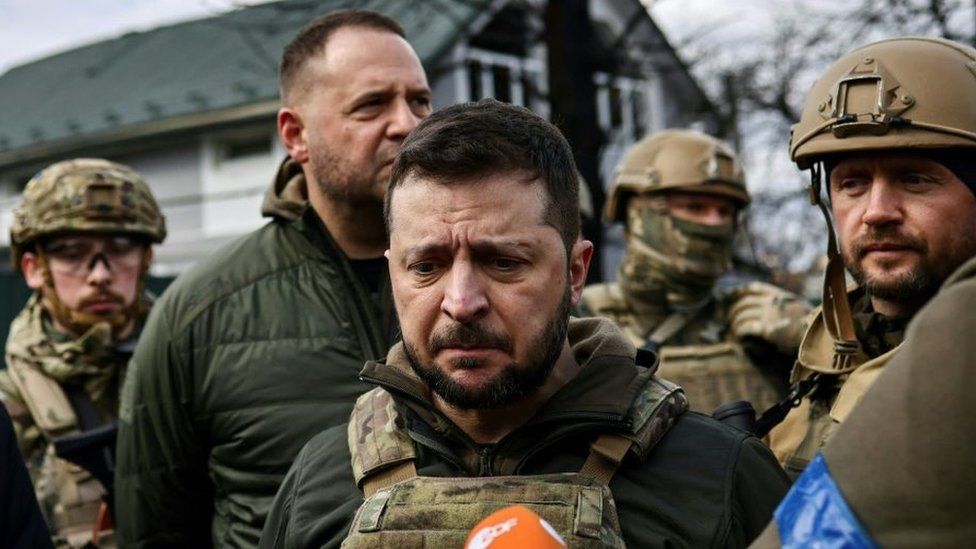Atrocities committed by Russian forces in Ukraine have sparked widespread accusations of war crimes – with some voices arguing that Moscow has gone even further.
“That is real genocide, what you have seen here,” Ukrainian President Volodymyr Zelensky said from Bucha, where at least 500 people have been found dead since the Russians left.
Poland’s Prime Minister Mateusz Morawiecki agrees that the killings in Bucha and other towns near the capital Kyiv “must be called acts of genocide and be dealt with as such”.
UK Prime Minister Boris Johnson has said attacks on civilians in Bucha do not “look far short of genocide”.
Now US President Joe Biden has accused Russian forces of committing acts of “genocide” in Ukraine. He said Russian President Vladimir Putin was trying to “wipe out the idea” of a Ukrainian identity.
But many countries have stopped short of using the word to describe what’s happening in Ukraine. French President Emmanuel Macron says he is reluctant to use the term and warned against an “escalation of rhetoric”.
So is there a case for accusing Russian forces of committing what has been called the “crime of all crimes”?
What is genocide?
Genocide is widely seen as the most serious crime against humanity.
It is defined as a mass extermination of a particular group of people – for example, the murder of six million Jews in the Holocaust of World War Two.
The UN Genocide Convention defines genocide as committing any of the following “with the intent to destroy, in whole or in part, a national, ethnic, racial or religious group”:
- Killing members of the group
- Causing serious bodily or mental harm to members of the group
- Deliberately inflicting on the group conditions of life calculated to bring about its physical destruction in whole or in part
- Imposing measures intended to prevent births within the group
- Forcibly transferring children of the group to another group
Has Russia committed genocide in Ukraine?
There is no consensus on this.
Eugene Finkel, an associate professor of international affairs at Johns Hopkins University, believes genocide is underway in Ukraine. He says there is evidence of killings, carried out in Bucha and other places, of people based on their Ukrainian identity.
“It’s not just killing people, it’s targeting a national identity group,” he says.
However, it’s the rhetoric coming from Moscow that tips over into genocidal intent, Mr Finkel says.
He points to an article titled “What should Russia do with Ukraine?” published last week by Russia’s state-owned media Ria news agency.
The article argues that Ukraine “is impossible as a nation state” and even its name “apparently cannot be retained”; the Ukrainian nationalist elite “need to be liquidated, its re-education is impossible”, argues the article’s writer, Timofei Sergeytsev.
He bases his theory on the baseless claim that Ukraine is a Nazi state, arguing that a significant section of the population is guilty too because they are “passive Nazis”, and therefore accomplices. After a Russian victory these people would require re-education lasting at least a generation and it would “inevitably mean de-Ukrainisation”.
“For me, the shift in tone in recent weeks in Russia, and especially among the elites, was the tipping point that we call the threshold of intent, not just to destroy the state… but to destroy an identity,” says Prof Finkel.
“The goal of the war is de-Ukrainisation… they are not focusing on the state, they’re focusing on Ukrainians.”
 IMAGE SOURCE, REUTERS
IMAGE SOURCE, REUTERSGregory Stanton, founding president and chair of Genocide Watch, says there is proof “that the Russian army is in fact intending to destroy, in part, the Ukrainian national group”.
“That’s why they’re targeting civilians. They’re not just targeting combatants and military.”
He says President Putin’s claims in the lead-up to the invasion, that the eight-year war in Ukraine’s east looked like genocide, were what some scholars call “mirroring”.
“Often the perpetrator of genocide will accuse the other side – the targeted victims – of intending to commit genocide before, in fact, the perpetrator does so. That’s what happened in this case.”
‘Evidence not strong enough yet’
But other experts in the field of genocide say it’s too early to define Russian atrocities as being in that category.
According to Jonathan Leader Maynard, lecturer in international politics at King’s College London, says the evidence is still too unclear under the strict wording of the Genocide Convention.
That doesn’t necessarily mean genocide is not taking place – he says it’s “very clear” that atrocities are happening – just that the bar has yet to be cleared.
“It’s possible that those atrocities could be genocidal or could escalate in future to genocide, but the evidence is not strong enough yet,” he says.
However, he points to the “deeply troubling” rhetoric of Russia’s president denying Ukraine’s historical existence as an independent nation. It illustrates a “genocidal way of thinking”, he says, where Vladimir Putin believes Ukraine “isn’t real, so they don’t have the right to exist”.
 IMAGE SOURCE, GETTY IMAGES
IMAGE SOURCE, GETTY IMAGESThe risk of genocide is increasing due to that kind of talk, he says, “but we cannot automatically assume that such rhetoric is going to lead to actions carried out on the ground”.
For Philippe Sands, there appears to be evidence of war crimes given the targeting of civilians and the siege of the port city of Mariupol appears to be a crime against humanity.
However, Prof Sands, who is director of the Centre for International Courts and Tribunals at University College London, says in order to prove genocide under international law, a prosecutor must establish an intent to destroy a group, in whole or in part. And international courts have set a very high threshold for proving that.
Intent can be established by direct evidence where the perpetrators say they are killing people in order to destroy the group. But Prof Sands believes that is unlikely to exist in Ukraine’s case.
Intent can also be inferred from a pattern of behaviour, “but that’s a tough call”, he adds. Not enough is known yet of the intentions of those Russians alleged to have carried out atrocities.
“Going into a village and executing a significant proportion of adult males from one national or religious group on an apparently systematic basis – if that is what happened in Bucha – could be an indicator of a genocidal intent,” he says.
“But at this stage we have insufficient evidence to know what precisely happened and why. I think it’s right to be extremely alert to signs of genocidal intent, as the war moves to the east of Ukraine and becomes increasingly brutal.”
Prof Sands says that the term genocide is often “being used in a political rather than legal sense”, and that he has “no objection to President Zelensky and President Biden evoking a possible genocide to garner attention toward the horrors that are being perpetrated”.
President Putin is displaying genocidal rhetoric, Mr Hinton says, but this will need to be clearly linked to atrocities on the ground to prove genocidal intent.
If Ukrainian government reports are confirmed that Ukrainian children are being separated from their parents with a view to having them adopted by Russian families, that would constitute a genocidal act, he says.
Whether or not Russia is committing genocide should not cloud what Alex Hinton sees as clear atrocities being committed by Russian forces in Ukraine.
“We know atrocity crimes are taking place and that compels action. It shouldn’t be a case where we think it has to be genocide to do more.”
Source: BBC News


